You are currently browsing the tag archive for the ‘League of Michigan Bicyclists’ tag.

Don’t miss the next Prosperity Agenda focused on Complete Streets in Michigan. Listen here today or tune in at 7 p.m. tomorrow, June 25th, for those who get NewsTalk 760 WJR Radio.
Dan Gilmartin of the Michigan Municipal League and co-host Dustin Block, news director for MLive Detroit, talk about Complete Streets and how these projects are taking hold in Michigan and transforming our communities with guests Suzanne Schulz, Planning Department Director for the City of Grand Rapids, Economic Development Program Manager for the Woodward Avenue Action Association, Jason Fowler, and John Lindenmayer, Advocacy and Policy Director for the League of Michigan Bicyclists and co chair of the Michigan Complete Streets Coalition.
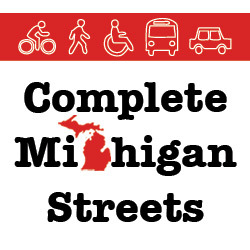 Yesterday the State Transportation Commission (STC),a six-member board that establishes policy and plans for Michigan’s transportation department, formally adopted a Complete Streets policy. The policy will direct Michigan Department of Transportation planners to keep all users in mind – including bicyclists, transit riders, motorists and pedestrians of all ages and abilities.
Yesterday the State Transportation Commission (STC),a six-member board that establishes policy and plans for Michigan’s transportation department, formally adopted a Complete Streets policy. The policy will direct Michigan Department of Transportation planners to keep all users in mind – including bicyclists, transit riders, motorists and pedestrians of all ages and abilities.
The STC invited public comment on the draft Complete Streets policy released at its June 28 meeting in Sault Ste. Marie. Many citizens and bicycle and pedestrian advocates across the state took advantage of the public comment period to request that the policy include stronger, clearer and more specific language with firm timelines for implementation. This included a petition drive led by the League of Michigan Bicyclists (LMB), which collected nearly 2500 signatures in a single week.
We thank the STC for being so responsive to the requests made by concerned citizens. Added and/or modified language strengthened the final policy providing more clarity in a number of areas as outlined below. A big thanks also goes out to all of the Michigan Complete Streets advocates who took the time to comment on the draft policy - your voices were heard!
Public Act 135 of 2010 requires the STC to enact a Complete Streets policy by August 2012. The STC has worked closely with the governor-appointed 18-member Complete Streets Advisory Council on the draft policy. The group’s role, according to law, is to advise the STC, county road commissions and municipalities on Complete Streets policies. Council members represent road and transit agencies, state agencies, walking and biking organizations, and environmental, senior citizens and disabled persons groups.
Below is a analysis of the final policy comparing it to the major revisions requested by the LMB petition.
- Strengthen implementation language.
- Identify the procedures or guidelines that will be developed or revised. – Did not include.
- Include a timeframe by which implementing documents will be developed or revised. – Included, by December 31, 2013.
- State a commitment to continue programs to educate and train MDOT personnel and other stakeholders on complete streets implementation. – Included language about training/education.
- Include language about implementation accountability. – Included language with a bit more specificity on what MDOT will report annually to the STC, but nothing about who will be responsible for developing/revising procedures, etc.
- State a commitment to continuing to base facilities design and construction on existing laws, best practices, and guidance documents. – Included language about this.
- Strengthen exception language.
- Refer to the exceptions already outlined in PA 135. – Not specifically referenced.
- Include a timeframe by which an exception procedure document will be developed. – Included, by December 31, 2013
- Include language about developing and using performance measures. – Included language about what MDOT will report annually to the STC, which stated “any information/examples to gauge MDOT’s performance.” (Not exactly what we was requested.)
- Strengthen language to direct MDOT to work with local road agencies (change “may” to “shall”). – Language was strengthened; “MDOT shall work with local road agencies that are undertaking road or bridge projects with federal funds…”
- Amend language about the network approach to expand “non-motorized” users to include all users, including people with disabilities and transit users. – Language states “all users”
- Specify whether there will be a sunset on annual reports to the State Transportation Commission. – Not specified.
Read the final policy below or download a PDF here.
Stand up for Complete Streets and the preservation of non-motorized funding at the 2012 Lucinda Means Bicycle Advocacy Day on May 23rd.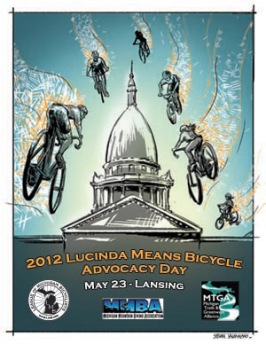
Bicyclists and Complete Streets supporters will meet with members of the Michigan Legislator on May 23rd at the State Capitol to advance legislative priorities aimed to make Michigan a more bicycle-friendly state. The event will be hosted by the League of Michigan Bicyclists, Michigan Trails and Greenways Alliance and Michigan Mountain Biking Association. All non-motorized transportation advocates are encouraged to participate.
Their Advocacy Agenda (PDF) includes a number of items such as establishing vulnerable roadway user designations for bicyclists, pedestrians and wheelchair users to create enhanced penalties for drivers who injure or kill a vulnerable roadway user. Advancing bikes-on-trains is another top priority. Roll-on bike service would allow cyclists to take bicycles on-board Michigan Amtrak trains, making multi-modal travel easier in Michigan. This would extend Complete Streets principles of connectivity further than a communities geographic boundaries by linking local bicycle networks and passenger rail service.
Also included in the Advocacy Day agenda are a few bills that are raising the eyebrows of Complete Streets advocates across the state. SB 921 (Ouiment) and HB 5304 (Jansen) were both recently introduced as part of Governor Snyder’s transportation funding reform proposals. Language in these bills, needlessly eliminates the Michigan Complete Streets Advisory Council (MCSAC). The Council, comprised of representatives from 18 statewide government and non-government stakeholder agencies, was created as a result of Public Act 135 of 2010. It is charged with providing education and advice to the State Transportation Commission (STC), county road commissions, municipalities, interest groups, and the public on the development, implementation, and coordination of Complete Streets policies.
To date, the MCSAC has focused its efforts solely on drafting recommendations for the STC regarding the statewide policy for MDOT. As a result, little guidance has been provided to local units of government across the state.
While Michigan leads the nation with the most adopted Complete Streets ordinances and resolutions (over 70 in total), many communities are still hesitant to advance Complete Streets until the MCSAC provides further recommendations. The MCSAC provides valuable oversight and guidance for the effective implementation of Complete Streets throughout the state. Dissolving the MCSAC will create an unfortunate void for communities seeking to make their roads and streets safer for all users. The collective expertise of MCSAC should continue to be utilized as MDOT and local communities work to implement the finalized policy.
Another bill of concern is HB 5303, which removes a funding requirement from Act 51 that obligates communities and road agencies to spend a minimum of 1% of their transportation funding on essential non-motorized transportation projects.
Worse yet, HB 5303 includes provisions that reward funding to road agencies based on the number of Vehicle Miles Traveled (VMT) under their jurisdiction. This creates disincentives for investments in alternative transportation options such public transit systems and bicycle networks.
The bill penalizes communities and road agencies for making systemic improvements like “road diets,” a popular technique that reduces the number of travel lanes on roads designed to carry more vehicle traffic than they do in reality. A common “road diet” improvement converts four-lane roads that have lower traffic volumes into two-lane roads that also include center turn lanes and additional safety features such as bike lanes, creating new transportation options without causing additional congestion.
You can learn more about these issues and register for the 2012 Lucinda Means Bicycle Advocacy Day at www.LMB.org/advocacyday.
Reposted from the League of Michigan Bicyclists

Currently in Michigan, bikes are not allowed on board Amtrak trains, nor as checked luggage. Urge Amtrak to allow bikes on Michigan trains. Click the image to sign the petition.
LMB is extremely pleased that the recently published Michigan State Rail Plan makes clear recommendations that bicycles need to be accommodated on Michigan passenger trains. LMB thanks the Michigan Department of Transportation for recognizing this need. We also thank all of our supporters who responded to our call to submit comments to the rail plan this past year.
We now are asking for your help again to ensure that these recommendations are acted on promptly. Please sign our petition urging Amtrak to implement roll-on bicycle service on all Michigan service routes as they have already done in other states.
Currently in Michigan, bikes are not allowed on board Amtrak trains, nor as checked luggage. On board accommodations for bicycles will make seamless multi-modal connections possible by allowing passengers to bicycle to train stations, ride the train, and then conveniently bicycle to their final destinations within the community.
Our state is home to a number of bicycle tours in or near Michigan communities serviced by Amtrak. By adding bike facilities on Amtrak trains, many Michigan communities could benefit from increased tourism spending, particularly from vacationing Chicago residents. Without options to bring bicycles on board, Michigan is losing out on significant travel-related spending generated by bicycle tourism. Commuters traveling within Michigan would also have additional transportation options.
We encourage everyone to sign the petition, but it is especially important for Amtrak to hear from individuals living or working in or around current stations locations in Albion, Ann Arbor, Bangor, Battle Creek, Birmingham, Dearborn, Detroit, Dowagiac, Durand, East Lansing, Flint, Grand Rapids, Holland, Jackson, Kalamazoo, Lapeer, New Buffalo, Niles, Pontiac, Port Huron, Royal Oak, and St. Joseph/Benton Harbor. [The petition has received over 2350 signatures since it was launched]
Please click here to add your name to the petition and please share the petition link over your networks. When you add your name to the petition please use the “Why This Is Important” option to help personalize the message.
For those on Facebook, we have also created a Facebook Event titled “Tell Amtrak to Allow Bikes on Trains - Sign the Petition” to help raise awareness around this issue.
We sincerely appreciate your support on this issue and hope that by spring we will all have the ability to bring bicycles on board passenger trains in our state.
Winning Campaigns Training
Date: August 26 - August 28
Location: Lansing (Michigan Fitness Foundation,1213 Center Street)
Looking for a great way to jumpstart a local Complete Streets campaign? Have a policy already and trying to figure out how to implement it? Look no further!
The Alliance for Biking and Walking’s signature Winning Campaigns Training uses proven curriculum targeted specifically to the unique needs and experience of bicycle and pedestrian advocates. This sought-after workshop, conducted in cities across North America, creates new advocates and reignites veteran organizers with critical skills to effect immediate change in their communities. In just three days, participants learn key organizing tactics in strategizing, funding and conducting campaigns that transform the transportation landscape in their cities and states. These trainings are intended for any potential campaign leader in your organization who would benefit from gaining the tools to craft and manage powerful advocacy campaigns.
Advocacy Advance: Tapping Federal Funding
This training will mirror the curriculum of a traditional Winning Campaigns Training, but will be specifically focused on campaigns that relate to Advocacy Advance, a partnership between the Alliance and the League of American Bicyclists aimed at doubling federal funding for bicycle and pedestrian projects by 2013.
REGISTER HERE:
http://bit.ly/kuodjN
For more information about Advocacy Advance:
www.advocacyadvance.org
To read the reports produced by the Advocacy Advance team:
http://www.bikeleague.org/resources/reports/
Tentative Scheduling Information:
The training begins Friday afternoon from 5 to 9 p.m. The training continues Saturday 8 a.m. to 6:30 p.m., with a break in the middle of the day for a bike ride. Saturday’s training is followed by a social gathering out on the town. Finally, Sunday’s schedule is 8 a.m. to 1 p.m., allowing a participant more than 18 hours of training devoted to developing a winning campaign.
Registration includes snacks Friday evening, and breakfast and lunch Saturday and Sunday. A bicycle or walking tour Saturday evening is also included.
Pricing Information:
Early registrations must be received by Fri, July 29, 2011 and cost $75 for Alliance members; $125 for non-members
Regular Registrations cost $100 for Alliance members; $150 for non-members
Scholarships:
A limited number of scholarships are available, courtesy of our sponsor, Clif Bar. To apply, please e-mail [email protected] with the following information: name, organization, reason you are requesting a scholarship. As this training works best when several individuals from an organization attend, priority will be given to organizations that are sending multiple participants to the training. Requests will be considered on a rolling basis and responded to within 4 weeks . Scholarship requests should be submitted early for best chance at receiving limited funds.
About the Host Organization:
The League of Michigan Bicyclists (LMB) is a non-profit, statewide membership organization that promotes bicycling and the safety of bicyclists on the roadways in Michigan. Since 1981 LMB has worked towards improved bicycle facilities and the acceptance of responsible bicyclists as legitimate road users. LMB works to educate bicyclists, public officials, and the general public about the benefits of cycling and the rights of bicyclists. LMB hosts numerous annual events including the Michigan Bicycle Summit, Lucinda Means Bicycle Advocacy Day and a number of multi-day bicycle tours.
About the Host City:
Lansing is Michigan’s capital city, and an important center for educational, cultural, governmental, business, and high-tech manufacturing institutions. The home of state government and many thriving businesses, downtown is buzzing with activity day and night. Just three miles away from the state capitol building is the scenic campus of Michigan State University. Connecting downtown to the MSU campus is the award-winning 13-mile Lansing Rivertrail, the region’s premier non-motorized facility. The City of Lansing has made major strides in recent years to become more pedestrian and bike-friendly, including passing Michigan’s first complete streets ordinance in 2009, and becoming a League of American Bicyclists’ Bike-Friendly Community in 2010
REGISTER HERE:
http://bit.ly/kuodjN
Reported by Paul Lamoureux, Northville Resident
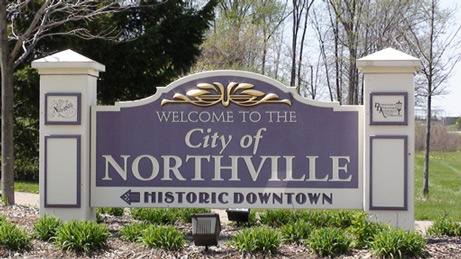
With unanimous accord, the Northville City Council adopted a complete streets resolution at its regular meeting on Monday, June 20. The measure was hailed by its author and initial proponent, City Manger Patrick Sullivan, as a necessary first step toward the establishment of a comprehensive non-motorized master plan designed to link Northville residents with nearby communities of Novi and Plymouth. It turns out Mr. Sullivan has prior, job-related experience with non-motorized infrastructure and has experienced first hand the positive community and economic benefits when a community accommodates all modes of transportation.
Several interesting facts emerged during the discussion of the resolution. Novi, with its own complete streets resolution, was cited as an example of a community benefiting from its long-standing non-motorized plan whose residents have long sought better access to commercial downtown Northville. Residents of both communities also seek a method to bike and walk to nearby Maybury State Park, a presently unsupported route and primary goal for the future. Finally, some expressed support for a better, biker-friendly connection between downtown Northville and Hines Park terminating at the city’s southern border.
A pair of Northville resident League of Michigan Bicyclists (LMB) members first approached the City Manager just a few short months ago to communicate the complete streets message. The city then availed itself of the resources provided by micompletestreets.org and the Michigan Municipal League. Upon passage of the resolution, City Council expressed their interest in further support from LMB in the drafting and implementation of the non-motorized master plan and expressed their gratitude for their leadership thus far in the process.
We are honored to report that the League of Michigan Bicyclists (LMB) was awarded the Winning Campaign of the Year by the Alliance for Biking and Walking for our success with the Michigan Complete Streets Coalition. The Alliance made the following post to its members concerning the award:
At the start of 2010, Michigan had just one local complete streets ordinance. By the end of the year, there were more than 20 communities with complete streets policies [Michigan has increased this to 32 communities since the beginning of the year!] and the Governor had signed a new statewide complete streets law. That incredible and rapid transformation was sparked and spurred by advocates from the League of Michigan Bicyclists, who helped to create a powerful Michigan Complete Streets Coalition with over 100 diverse partner organizations. That powerful, unified voice led to the passage of a statewide complete streets bill, the adoption of policies in a number of communities and a new priority within the state Department of Transportation to plan streets that safely accommodate bicyclists and pedestrians. Thanks in large part to this Winning Campaign, the state that spent the last century focused on all things automotive is now leading the way in the Great Lakes region.
Since 2009, the Alliance has solicited public nominations and recognized the individuals, organizations and business leaders who are propelling our People Powered Movement.
“Our 2011 award winners represent all corners of the continent and a variety of different campaigns and initiatives to increase biking and walking,” Jeff Miller, Alliance President/CEO, said. “But they are all shining examples of the energy, enthusiasm and progress of the bicycle and pedestrian advocacy movement - a movement that is transforming communities across North America.”
Associate Director John Lindenmayer and Board Vice Chair Rory Neuner received the award on behalf of LMB at a special reception following the opening plenary of the National Bike Summit in Washington DC on March 8th.
LMB is extremely honored to have received this recognition and look forward to continuing our partnership with AARP of Michigan, Michigan Environmental Council and the rest of the Coalition to advance complete streets across the state.
This week the Washtenaw County Road Commission approved road diets (turning a four lane road into two traffic lanes, a center turn lane and bike lanes) for Golfside Road in Pittsfield Township and Ford Boulevard in Ypsilanti Township.
At the meeting opponents of the Ford Boulevard road diet argued that such a configuration would put them out of business, and that the number of crashes on Ford Boulevard were not all that many. Road Commission staff, however, pointed out that Ford Boulevard’s crash rate is much higher than it should be and that study after study has shown that road diets reduce crash rates.
Supporters of the road diets included League of Michigan Bicyclists, Washtenaw Bicycling and Walking Coalition, Bike Ypsi and Friends of the Border To Border Trail, all Michigan Complete Streets Coalition partners.
Construction on Ford Boulevard is expected to take place in 2011.
Road Diets are a cost-effective tool to calm traffic and reclaim street space for other roadway users such as bicyclists. With many Michigan roads built for to carry a larger amount of automobile capacity than they actually do, road diets are low hanging fruit opportunities for Complete Streets advocates to push for in their own communities.
Road diets, however, do not always go over well with the auto-centric public, as has been seen recently in Williamston and Jackson. It just goes to show why nonmotorized plans and Complete Streets policies are so important so these battles do not happen on a road by road basis.
We salute the Washtenaw County Road Commission for supporting the concept of road diets. They may find that adopting their own Complete Streets policy, as the Ingham County Road Commission recently did, may help demonstrate to the community a long-term commitment to building active transportation infrastructure.
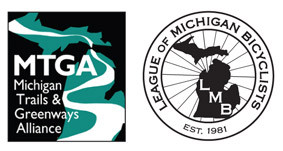 Today, the League of Michigan Bicyclists (LMB) and Michigan Trails and Greenways Alliance (MTGA) submitted a letter opposing a proposed amendment to HB 6151 and 6152 by the County Road Association of Michigan (CRAM). As these Complete Streets bills reach the homestretch of the legislative process, CRAM is seizing this opportunity to attempt changes to Act 51, Section 10k, the only guaranteed source of funding for nonmotorized infrastructure in the state transportation budget.
Today, the League of Michigan Bicyclists (LMB) and Michigan Trails and Greenways Alliance (MTGA) submitted a letter opposing a proposed amendment to HB 6151 and 6152 by the County Road Association of Michigan (CRAM). As these Complete Streets bills reach the homestretch of the legislative process, CRAM is seizing this opportunity to attempt changes to Act 51, Section 10k, the only guaranteed source of funding for nonmotorized infrastructure in the state transportation budget.
As it currently stands, Section 10k requires (as it has for the past 32 years) that 1% of all surface transportation funding in the state transportation budget be allocated to nonmotorized transportation. Eligible projects can include sidewalks in cities and villages, bike lanes, widened shoulders, trails within the road right of way, campaigns for the safety of cyclists on Michigan roads and public education efforts in all jurisdiction that are eligible for transportation funding. This is not a hardship as jurisdictions have ten years in which to accumulate and spend these funds. It should also be noted that nonmotorized facilities, such as bike lanes and wide shoulders, have been proven to extend the life of our roads by protecting their edges.
While CRAM has made it clear from day one that they oppose these bills, they have chosen not to express their opposition publicly and instead have stated both in the House and Senate that they support these bills “in concept only.” Their last-minute attempt to tack on an unrelated issue to bills that have seen overwhelming nonpartisan support in both the House and Senate as well as the general public is certainly unfortunate to say the least.
HB 6151 and 6152 will soon be up for a vote on the Senate floor, possibly as soon as tomorrow, July 28th. We are asking all Complete Streets supporters to voice support for these bills to your State Senator and express opposition to CRAM’s efforts to eliminate mandatory nonmotorized funding in Michigan. A few bulleted concerns regarding CRAM’s ammendment are below and the letter of opposition by LMB and MTGA can be read here.
Concerns with CRAM Amendment:
- MDOT does not have the ability to leverage the large variety of different funding sources to satisfy the 1% requirement making it no longer a level playing field.
- Creates an environment of “haves, and have nots” among local road agencies. Some communities may not have the capacity, know how, or resources to leverage other sources of funding.
- Utilization of other funding sources may create challenges associated with auditing, reporting enforcement of compliance by MDOT and the Michigan Department of Treasury.
- Utilizing other sources may create issues associated with ensuring the funding is being used for appropriate non-motorized facilities.
- Current nonmotorized funding needs far exceed the current 1% requirement which means they should be using all other available funds to match or leverage the 10k investment - NOT replace it!
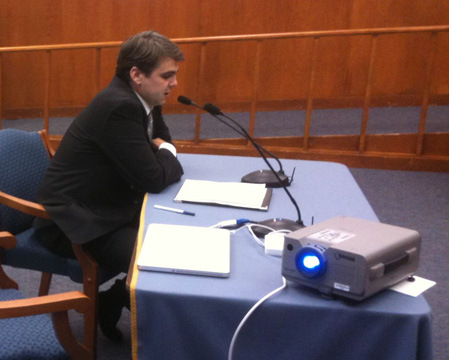
Sean Mann of Let's Save Michigan discussing the economic benefits for communities that adopt Complete Streets policies.
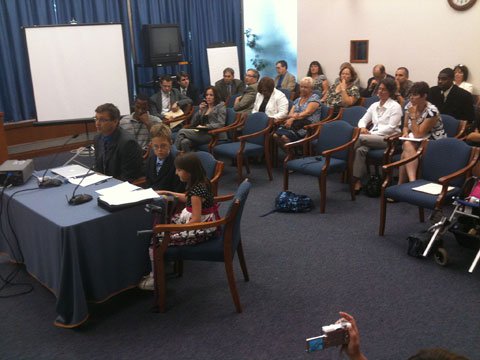
- Katie Birchmeier (10), Conor Waterman (9) and James Kleimola (18) testify in support of Complete Strees with PEAC’s John Waterman.
Complete Streets legislation, H.B. 6151 and 6152, passed* unanimously out of the Senate Transportation Committee today! The Committee had only planned on taking testimony today, but we must have won them over with a packed room, an overflowing table of written testimony and numerous articulate, well-spoken supporters. The bills will now move on to the Senate floor for a full vote.
The room was once again packed with advocates who voiced their support for Complete Streets, including organizations such as SEMCOG, Let’s Save Michigan, Mid-Michigan Environmental Action Council (Mid-MEAC) and AARP Michigan to local citizens like Lyndon Babcock and Michelle Miles. After hearing children from the Program to Educate All Cyclists (PEAC) testify, Senator Basham commented, “Certainly, Connor, Katie and James helped me make up my mind.”
The League of Michigan Bicyclists also provided the Committee with a brief powerpoint presentation, on Complete Streets. PDF versions of everyone’s testimony can be found here.
Congratulations to all of our supporters, and a special thank you to those who submitted written testimony and spoke at today’s hearing.
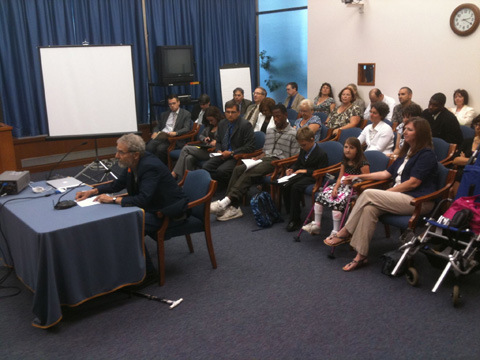
Lansing resident Lyndon Babcock speaks about the need for Complete Streets for people with disabilities.
* The Committee inadvertently excluded H.B. 6152, the second Complete Streets bill in the package, from their vote today. Chairman Gilbert said the committee will discharge H.B. 6152 out of committee with recommendation to the Senate floor.















